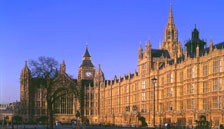The Chancellor of the Exchequer, George Osborne, has made his Autumn Statement to Parliament. Here are the key points affecting the automotive industry and motoring in the UK.
The full autumn statement can be dowloaded here.
Fuel duty
3p rise in fuel duty in January cancelled
5 pence per litre rise proposed for August 2012 will be reduced to 3 pence per litre
Osborne said: "...But millions more use their cars to go to work, and pick up the children from school. It is not a luxury for most people - it is a necessity. In the Budget I cut fuel duty by one penny. The plan was for fuel duty to be 3 pence higher in January and 5 pence higher by August next year. That would be tough for working families at a time like this.
"So despite all the constraints that are upon us, we are able to cancel the duty increase planned for January and for fuel duty from August to be only 3 pence higher than it is now.
"Taxes on petrol will be a full 10 pence lower than it would have been without our action in the Budget and this autumn. Families will save £144 on filling up the average family car by the end of next year. In these tough times, we are helping where we can."
Research and development tax credits
In a boost to the UK's automotive industry, the R&D tax credit system is to be reviewed, helping to safeguarding jobs, and strengthen the industry's position in the global market.
Osborne said: "We have listened to the ideas from business groups about encouraging innovation in larger companies, and we will introduce a new ‘above the line' research and development tax credit in 2013 that will increase its visibility and generosity."
National Loans Guarantee Scheme
£20 billion will be available over next two years to reduce income rates for small businesses - George Osborne estimates it will cut the average interest rate faced by those firms by 1%.
Osborne said: "It will work on the simple principle that we use the hard-won low interest rates that the Government can borrow at, to reduce the interest rates that small businesses can borrow at.
"We’re using the credibility we’ve earned in the international markets to help our domestic economy.
"New loans and overdrafts to businesses with a turnover of less than £50 million will be eligible for the scheme – so it stays focussed on smaller companies. We expect it will lead to reductions of 1 percentage point in the rate of interest being charged to these companies.
"So a business facing a 7% interest rate to get a £5 million loan could instead see their rate reduced to 6% and their interest costs fall by up to £50,000. We have developed with the Bank of England a mechanism to allocate funding to different banks based on how much they increase both net and gross lending to firms. And there will be a clear audit trail to ensure the banks comply – for we will use the experience of the European Investment Bank’s Loans for SMEs programme here in the UK to ensure it works.
"We are getting state aid approval so that the National Loan Guarantee Scheme will be up and running in the next few months. Initially £20 billion of these guarantees will be available over the next two years."
Business rates
The rate relief holiday has been extended until April 2013. The extension will provide much needed financial relief to struggling businesses across the UK.
Osborne said: "In the Budget, I provided a holiday on business rates for small firms until October next year. I am today extending that rate relief holiday until April 2013.
"Over half a million small firms - including one third of all shops - will have either reduced or no rate bills, for the whole of this year and for the whole of next financial year too. And to help all businesses, including larger ones, with next year's rise in business rates, I will allow them to defer 60% of the increase in their bills to the two following years."














Login to comment
Comments
No comments have been made yet.